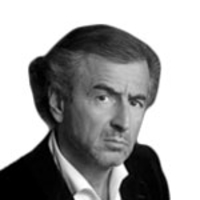It is the second anniversary of the Libyan revolution.
And the first time that I have seen Ali Zeidan since he became that country’s prime minister.

Nicolas Sarkozy is present. Zeidan wanted to see him this evening, in a personal capacity, before beginning the official part of his visit.
Zeidan has the same modest air as before.
The same look of an unruly child behind his tortoise-shell glasses.
He’s wearing the same tired brown suit that he always wore on our visits to the front lines in Ajdabiya, Misrata, or Jebel Nafusa.
The leader of the country, the master of all of Libya’s parts, is a newcomer whose integrity, moral uprightness, and refusal to dishonor himself under the old regime eventually brought him, as some of us had predicted, to the exercise of a power that he always said he did not want. Despite that rise, nothing distinguishes the new Ali from the one who had been my companion two years ago, the images of whom, heroic and fragile, as set down in my war diary and in my film of the war, are easily superimposed with the one before me now. Nothing—truly, nothing—in Ali Zeidan’s attitude, in the explosion of booming laughter that greets me as I enter his hotel suite (laughter quickly followed by the slaps on the back of old comrades happy to be meeting again), or in his relationship with Mansour, his longtime friend and now his closest adviser—has changed.
He expresses his gratitude to Sarkozy, without whose tenacity nothing would have been possible.Thanks for recognizing the Transitional National Council on March 9, 2011, he says; thanks for listening to us, on April 13, on the occasion of the secret night visit we paid you in the company of General Younes, when we proposed the opening of a new front in the Berber mountains; thanks for receiving, on July 20, the commanders of the rebel forces in Misrata, who had slipped through the blockade of their city to explain to you that they were in a position to advance on Tripoli and end the war if only someone would give them the means. Thank you.
Zeidan responds, without evasion or circumlocution, but rather with the plainness that we had come to expect, at the time, from our western interlocutors—and especially from Sarkozy—to the questions that Sarkozy is asking him about the security situation in the country (which is certainly alarming, but not as bad as is portrayed in the media), about his government’s priorities (security, of course, but also dialogue, national reconciliation, and unity), and the fate of those members of the old regime who, like Saif al-Islam, Gaddafi’s favorite son, have the most blood on their hands (they, too, says the man who had been president of the Libyan Federation of the League of Human Rights, have the right to due process).
In response to the concern expressed by the former French president about the extent of the role played by Islamists in the country, Ali Zeidan counters that although the threat is present and should not be underestimated, it is marginal. The vast majority of the Libyan people, he says, remain faithful to the moderate Islam that is known, in Benghazi, as the middle ground and for which we all fought so hard. What, after all, is the “oath of Tobruk”—what, in addition to being the title of my film on the subject—if not the commitment that we all made—Zeidan, three of his Libyan companions, Gilles Hertzog, and myself—not to rest until democracy had begun to gain, for good, the upper hand over the dictatorial temptations of yesterday and today? We had gathered on a spring morning in the shadow of the cross of Lorraine that stands in the small cemetery of the French soldiers who died in the desert war against Nazism. That spring day was the darkest hour of the eternal night in which Gaddafi’s madness had plunged the men and women of Libya. And now, two years later, this scene, this moment of brotherhood revisited, with one of the takers of the oath in a position to make our dream come true—what a story!
I watch my friend watching his comrade in arms, Sarkozy, who is himself strangely quiet.
I see the complicity that binds them, a complicity that, despite the vicissitudes of life and political differences, binds me, too, to the two of them.
The self-styled experts can say what they want.
But here is the situation: If Ali Zeidan, a friend of the West and a pious and enlightened Muslim, is presiding over the destiny of his country, it is because, eight months ago, the Islamists lost the first free elections that Libya has ever known. They won in Egypt. They are in the majority in Tunisia. But in Libya they are the minority opposition. That’s how it is.
And here is another fact, or, rather, a theorem, about which there is really no doubt: when the West refuses to get involved, or when it takes, more or less overtly, the side of dictators, the Islamists who come to the fore, wearing the crown of martyrdom, walk off with the title of friend of the people. By contrast, when the West bestirs itself and extends a hand to people in revolt, when it debunks the image widespread in the region of former colonial powers in natural collusion with assassins, then the whole scene changes, and the ground gives way under the feet of those who aspire to a new tyranny. With that, having lost their best argument, the fanatics of the apocalypse lose the battle of power.
That is the lesson of Ali Zeidan.
A word (Syria) to the wise.
Translated by Steven B. Kennedy






